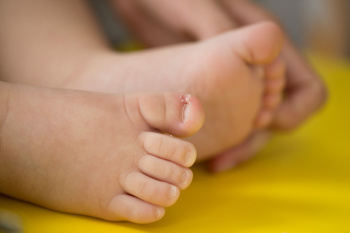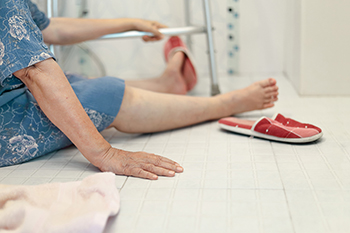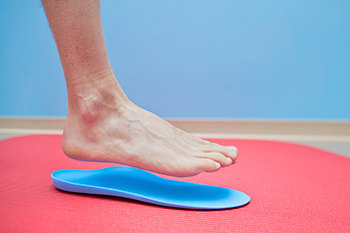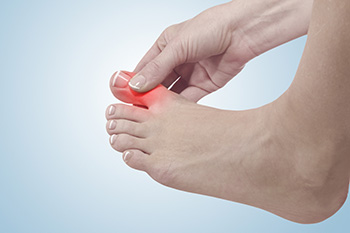Items filtered by date: February 2024
The Realities of Ingrown Toenails

Ingrown toenails occur when the edge or corner of a toenail grows into the surrounding skin, leading to pain, swelling, and potential infection. Typically affecting the big toe, ingrown toenails can result from a variety of factors. Improper nail trimming, such as rounding the corners or cutting them too short, increases the likelihood of ingrowth. Wearing tight-fitting shoes or high heels can exert pressure on the toes, contributing to the development of ingrown nails. Additionally, injury or trauma to the toe, genetic predisposition, and underlying health conditions like fungal infections or diabetes can elevate the risk. Ignoring ingrown toenails can lead to complications, including infections that may require medical intervention. Seeking timely attention from a podiatrist for ingrown toenails can help alleviate discomfort and prevent potential complications. If you have an ingrown toenail, it is suggested that you contact a podiatrist who can offer successful treatment options, which may include minor surgery for relief.
Ingrown toenails can become painful if they are not treated properly. For more information about ingrown toenails, contact Anas Khoury, DPM of North Eastern Foot & Ankle Specialists. Our doctor can provide the care you need to keep you pain-free and on your feet.
Ingrown Toenails
Ingrown toenails occur when a toenail grows sideways into the bed of the nail, causing pain, swelling, and possibly infection.
Causes
- Bacterial infections
- Improper nail cutting such as cutting it too short or not straight across
- Trauma to the toe, such as stubbing, which causes the nail to grow back irregularly
- Ill-fitting shoes that bunch the toes too close together
- Genetic predisposition
Prevention
Because ingrown toenails are not something found outside of shoe-wearing cultures, going barefoot as often as possible will decrease the likeliness of developing ingrown toenails. Wearing proper fitting shoes and using proper cutting techniques will also help decrease your risk of developing ingrown toenails.
Treatment
Ingrown toenails are a very treatable foot condition. In minor cases, soaking the affected area in salt or antibacterial soaps will not only help with the ingrown nail itself, but also help prevent any infections from occurring. In more severe cases, surgery is an option. In either case, speaking to your podiatrist about this condition will help you get a better understanding of specific treatment options that are right for you.
If you have any questions please feel free to contact our office located in Passaic, NJ . We offer the newest diagnostic and treatment technologies for all your foot and ankle needs.
Let the Expert Treat Your Ingrown Toenails
Taking Care of Your Toddler's Feet

Children's feet require vigilant care during their formative years, due to their soft and pliable nature. Encouraging toddlers to walk barefoot indoors fosters natural foot growth and toe dexterity. It is essential to regularly assess shoe fit, aiming for about half an inch of growing room between the longest toe and the tip of the shoe. Experts suggest measuring their feet and adjusting shoe size every three to six months to accommodate growth. While common walking patterns, such as flat feet or in-toeing, typically resolve on their own, it is suggested you consult a podiatrist if your child experiences persistent issues or discomfort. Avoid hand me down shoes to ensure proper support and fit tailored to each child's unique foot structure. Watch for signs such as frequent tripping, pain, or reluctance to participate in activities, as they may indicate underlying foot concerns that require medical attention. For guidance on your child's foot development or to address any emerging concerns, it is suggested that you schedule an appointment with a podiatrist for a thorough exam and appropriate treatment as needed.
Making sure that your children maintain good foot health is very important as they grow. If you have any questions, contact Anas Khoury, DPM of North Eastern Foot & Ankle Specialists. Our doctor can provide the care you need to keep you pain-free and on your feet.
Keeping Children's Feet Healthy
Having healthy feet during childhood can help prevent medical problems later in life, namely in the back and legs. As children grow, their feet require different types of care. Here are some things to consider...
Although babies do not walk yet, it is still very important to take care of their feet.
Avoid putting tight shoes or socks on his or her feet.
Allow the baby to stretch and kick his or her feet to feel comfortable.
As a toddler, kids are now on the move and begin to develop differently. At this age, toddlers are getting a feel for walking, so don’t be alarmed if your toddler is unsteady or ‘walks funny’.
As your child gets older, it is important to teach them how to take care of their feet.
Show them proper hygiene to prevent infections such as fungus.
Be watchful for any pain or injury.
Have all injuries checked by a doctor as soon as possible.
Comfortable, protective shoes should always be worn, especially at play.
If you have any questions please feel free to contact our office located in Passaic, NJ . We offer the newest diagnostic and treatment technologies for all your foot and ankle needs.
Custom Orthotics For Seniors

Age gracefully and move freely with Custom Orthotics. For seniors seeking to maintain their independence, Custom Orthotics offer the stability and comfort essential for daily activities. Custom-tailored to your feet, they provide support, reduce pain, and enhance mobility, ensuring you're always on sure footing. Don't let age-related foot concerns hold you back. With Custom Orthotics, embrace every golden moment with confidence. Call today to schedule an appointment.
Prevention Strategies for Enhanced Safety in Elderly People

Seniors are at a heightened risk of falling due to various factors, including age-related changes in balance, vision, and muscle strength. Additionally, underlying health conditions, medications, and environmental hazards contribute to the risk of falls among older adults. Vision impairments, such as cataracts or glaucoma, can affect depth perception and increase the likelihood of tripping or misjudging distances. Muscle weakness and joint stiffness make it more challenging to maintain balance and stability while walking or standing. Furthermore, medications that cause dizziness or drowsiness further compromise seniors' ability to navigate their surroundings safely. Environmental factors like cluttered walkways, slippery floors, and inadequate lighting also pose significant fall risks. To prevent falls, seniors can take proactive measures such as participating in regular exercise to improve strength and balance and modifying home environments to eliminate hazards. Falling can impact the feet, possibly compromising daily activities. If you are interested in learning about additional fall prevention strategies, it is suggested that you contact a podiatrist who can provide you with the knowledge you are seeking.
Preventing falls among the elderly is very important. If you are older and have fallen or fear that you are prone to falling, consult with Anas Khoury, DPM from North Eastern Foot & Ankle Specialists. Our doctor will assess your condition and provide you with quality advice and care.
Every 11 seconds, an elderly American is being treated in an emergency room for a fall related injury. Falls are the leading cause of head and hip injuries for those 65 and older. Due to decreases in strength, balance, senses, and lack of awareness, elderly persons are very susceptible to falling. Thankfully, there are a number of things older persons can do to prevent falls.
How to Prevent Falls
Some effective methods that older persons can do to prevent falls include:
- Enrolling in strength and balance exercise program to increase balance and strength
- Periodically having your sight and hearing checked
- Discuss any medications you have with a doctor to see if it increases the risk of falling
- Clearing the house of falling hazards and installing devices like grab bars and railings
- Utilizing a walker or cane
- Wearing shoes that provide good support and cushioning
- Talking to family members about falling and increasing awareness
Falling can be a traumatic and embarrassing experience for elderly persons; this can make them less willing to leave the house, and less willing to talk to someone about their fears of falling. Doing such things, however, will increase the likelihood of tripping or losing one’s balance. Knowing the causes of falling and how to prevent them is the best way to mitigate the risk of serious injury.
If you have any questions, please feel free to contact our office located in Passaic, NJ . We offer the newest diagnostic and treatment technologies for all your foot care needs.
Do I Need Orthotics?

Orthotics, custom-made shoe or heel inserts, are designed to cater to individual needs. Podiatrists recommend orthotics to address foot, leg, or back issues, aiming to enhance biomechanics, redistribute pressure, or accommodate deformities. They are distinct from over-the-counter inserts, being highly customized and prescribed when other treatments prove ineffective. To determine the need for orthotics, a podiatrist assesses symptoms, conducts physical examinations, and may use imaging techniques to diagnose conditions. Orthotics prove beneficial for various medical conditions, including arthritis, back pain, bunions, and more. They also provide support, cushioning, and alignment correction, while reducing the need for invasive treatments. Orthotics come in various types and materials and are tailored to individual conditions. Effectiveness varies depending on factors like fit, prescription, footwear, and adherence to usage recommendations. While studies support their use, proper fit and usage are essential for success. If you are wondering if custom-made orthotics can help you, it is suggested that you make an appointment with a podiatrist.
The benefits of custom orthotics are far-reaching and can make a significant impact on your daily life. Whether you are an athlete looking to enhance your performance, a healthcare worker on your feet every day, someone who experiences chronic foot pain, or someone who wants to improve their overall comfort and well-being, custom orthotics can be a game changer.
Custom orthotics provide support, stability, and relief for a variety of foot conditions ranging from flat feet to heel pain. They can even help prevent injuries and address more severe foot concerns, such as plantar fasciitis and diabetic foot issues.
Contact Anas Khoury, DPM at North Eastern Foot & Ankle Specialists to create tailored orthotics for you and enjoy a higher quality of life, reduced pain, and increased mobility. With the right orthotics, you can continue doing the things you love, whether it’s running, dancing, or simply walking comfortably without discomfort.
If you are suffering from foot discomfort or have concerns about your foot health, do not hesitate to contact Anas Khoury, DPM at North Eastern Foot & Ankle Specialists to explore the benefits of orthotics for you. Your feet are the foundation of your body and investing in their well-being can lead to a happier, healthier, and more active lifestyle. Your feet will thank you!
If you have any questions please contact our office located in Passaic, NJ . We offer the newest diagnostic and treatment technologies for all your foot and ankle needs.
Big Toe Pain May Mean Gout
 Gout, a type of arthritis, can cause intense pain that often starts in the big toe. This condition is caused by a build up of needle shaped uric acid crystals in the joints, leading to inflammation. The big toe is where painful gout attacks commonly occur because it is a cooler part of the body, and uric acid is more likely to crystallize there. Gout patients usually experience painful joint flares for a week or so, which then disappear for a period of time. Some patients do not experience their next flare for a year or more. Lifestyle factors such as a diet particularly rich in purine-containing foods in addition to genetics can contribute to gout development. During a gout flare up, the big toe may become red, swollen, and extremely tender. It is essential for those experiencing big toe pain to seek medical attention, as managing gout requires having a well informed plan. If you have pain in your big toe and suspect it may be gout, it is suggested you schedule an appointment with a podiatrist who can help you find relief from the acute pain associated with this condition.
Gout, a type of arthritis, can cause intense pain that often starts in the big toe. This condition is caused by a build up of needle shaped uric acid crystals in the joints, leading to inflammation. The big toe is where painful gout attacks commonly occur because it is a cooler part of the body, and uric acid is more likely to crystallize there. Gout patients usually experience painful joint flares for a week or so, which then disappear for a period of time. Some patients do not experience their next flare for a year or more. Lifestyle factors such as a diet particularly rich in purine-containing foods in addition to genetics can contribute to gout development. During a gout flare up, the big toe may become red, swollen, and extremely tender. It is essential for those experiencing big toe pain to seek medical attention, as managing gout requires having a well informed plan. If you have pain in your big toe and suspect it may be gout, it is suggested you schedule an appointment with a podiatrist who can help you find relief from the acute pain associated with this condition.
Gout is a painful condition that can be treated. If you are seeking treatment, contact Anas Khoury, DPM from North Eastern Foot & Ankle Specialists. Our doctor will treat your foot and ankle needs.
What Is Gout?
Gout is a form of arthritis that is characterized by sudden, severe attacks of pain, redness, and tenderness in the joints. The condition usually affects the joint at the base of the big toe. A gout attack can occur at any random time, such as the middle of the night while you are asleep.
Symptoms
- Intense Joint Pain - Usually around the large joint of your big toe, and it most severe within the first four to twelve hours
- Lingering Discomfort - Joint discomfort may last from a few days to a few weeks
- Inflammation and Redness -Affected joints may become swollen, tender, warm and red
- Limited Range of Motion - May experience a decrease in joint mobility
Risk Factors
- Genetics - If family members have gout, you’re more likely to have it
- Medications - Diuretic medications can raise uric acid levels
- Gender/Age - Gout is more common in men until the age of 60. It is believed that estrogen protects women until that point
- Diet - Eating red meat and shellfish increases your risk
- Alcohol - Having more than two alcoholic drinks per day increases your risk
- Obesity - Obese people are at a higher risk for gout
Prior to visiting your podiatrist to receive treatment for gout, there are a few things you should do beforehand. If you have gout you should write down your symptoms--including when they started and how often you experience them, important medical information you may have, and any questions you may have. Writing down these three things will help your podiatrist in assessing your specific situation so that he or she may provide the best route of treatment for you.
If you have any questions, please feel free to contact our office located in Passaic, NJ . We offer the newest diagnostic and treatment technologies for all your foot care needs.

